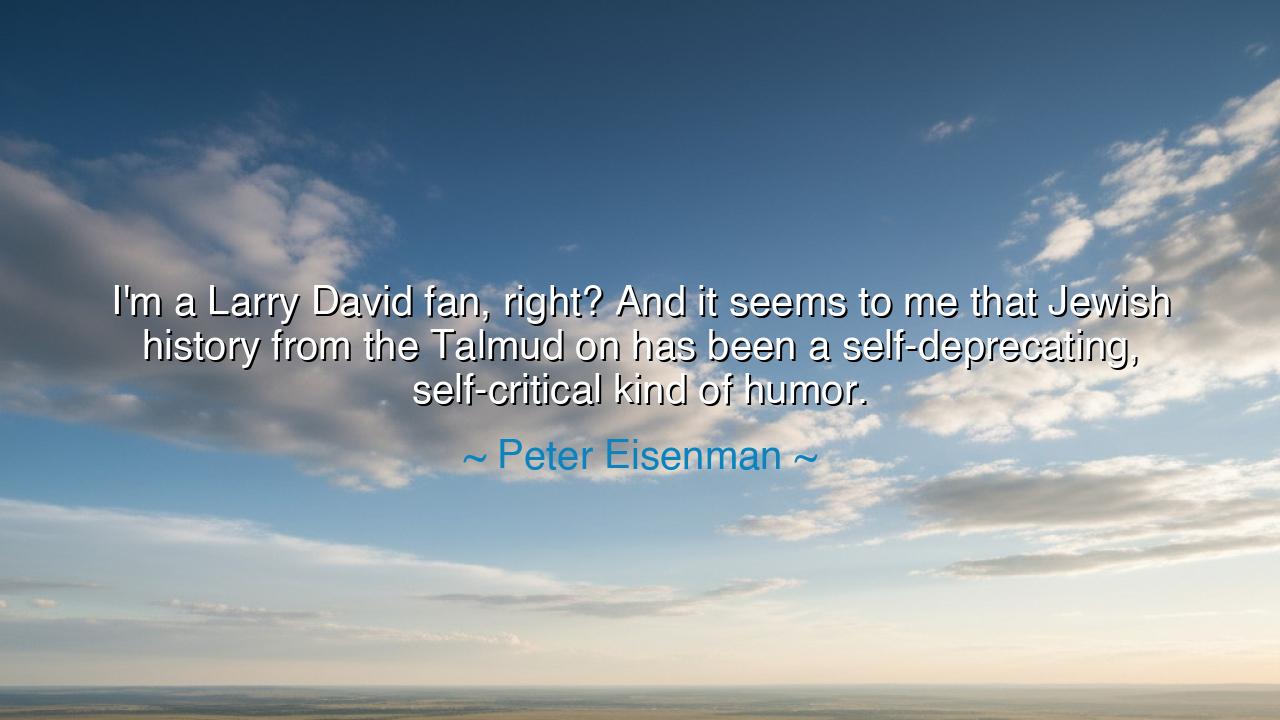
I'm a Larry David fan, right? And it seems to me that Jewish
I'm a Larry David fan, right? And it seems to me that Jewish history from the Talmud on has been a self-deprecating, self-critical kind of humor.






In the words of Peter Eisenman, “I'm a Larry David fan, right? And it seems to me that Jewish history from the Talmud on has been a self-deprecating, self-critical kind of humor.” Though spoken in passing, this statement carries the gravity of centuries — a reflection on a people whose humor was not born from comfort, but from struggle, not from excess, but from endurance. Eisenman, architect of ideas and monuments, sees in laughter not mere amusement, but a structure of the spirit — a way by which the Jewish people have survived the unendurable and transmuted sorrow into strength. His words remind us that humor, when wielded with humility, is both shield and sword — a quiet defiance against despair itself.
From the ancient days of the Talmud, the rabbis gathered to question, to debate, and to wrestle with the divine. They did not fear irony; they welcomed it. In their discourse lived the understanding that to question oneself, even to laugh at oneself, is not weakness — it is wisdom. This is the root of self-deprecating humor, that sacred art of turning inward laughter into armor. It is a mirror that shows the soul both its flaws and its beauty. When Eisenman speaks of this lineage, he speaks of an inheritance of resilience — the laughter that says, “We see our imperfections, and yet we live, we learn, and we continue.”
Larry David, to whom Eisenman refers, is the modern heir to this tradition — his comedy of discomfort, of human folly and contradiction, carries the same ancient tone. Through characters who stumble, blunder, and reveal the absurdity of social pretense, David reminds us of the eternal truth: that laughter at oneself is a path to self-knowledge. In him, the humor of the Talmudic scholars finds new form — not in sacred halls, but in the ordinary chaos of modern life. For the essence of Jewish humor, as Eisenman recognizes, lies not in mocking others, but in mocking the self as a way to transcend it.
This form of humor is not cynicism; it is a discipline of the soul. In it, sorrow finds release, arrogance finds balance, and intellect finds humility. Consider the trials of the Jewish people through exile, persecution, and loss — and yet, through it all, they laughed. Their laughter was not shallow joy, but an act of rebellion. When the world tried to take their dignity, they answered with wit. When oppression sought to silence them, they replied with irony sharper than any sword. Humor became the quiet proclamation that the human spirit cannot be broken so long as it can still laugh.
Let us recall the tale of Rabbi Akiva, who, upon seeing the ruins of the Temple of Jerusalem, laughed. His companions wept, but he smiled. When asked why, he said, “If the prophecy of destruction has come true, so too shall the prophecy of redemption.” His laughter was not madness, but faith — faith that understanding and renewal grow even from ashes. In this moment lies the essence of Eisenman’s reflection: that self-critical humor is not despair, but the seed of hope. It allows the soul to see itself clearly and still believe in its renewal.
Eisenman, as an architect, builds not just in stone but in memory. He understands that to create something lasting, one must confront history — even its pain — with honesty. To laugh at oneself is to refuse illusion, to strip away pretense until only truth remains. Just as the Talmudic scholars built their wisdom through questioning, so must each of us build our lives through self-awareness and humility. Humor, rightly understood, is a form of spiritual architecture: it constructs bridges between suffering and meaning, between fragility and endurance.
Thus, the lesson of his words is clear: learn to laugh at yourself with reverence, not contempt. Let your humor be the song of understanding, not the noise of mockery. Be self-critical not to destroy, but to grow. For when a person can look upon their own errors and smile with kindness, they become unshakable. The proud man breaks under truth; the humble man bends and is made stronger.
So, dear listener, remember this teaching: laughter is wisdom clothed in lightness. Practice it as the sages did — with compassion, with courage, and with the awareness that through humor, we cleanse the soul of fear. Whether in the halls of the Talmud or the stages of modern comedy, the message endures — to know oneself fully, to see both flaw and brilliance, and to meet it all with a smile. For in that smile lies the oldest and truest act of faith: that no matter how dark the night, the spirit can still find light — and sometimes, that light begins with laughter.






AAdministratorAdministrator
Welcome, honored guests. Please leave a comment, we will respond soon